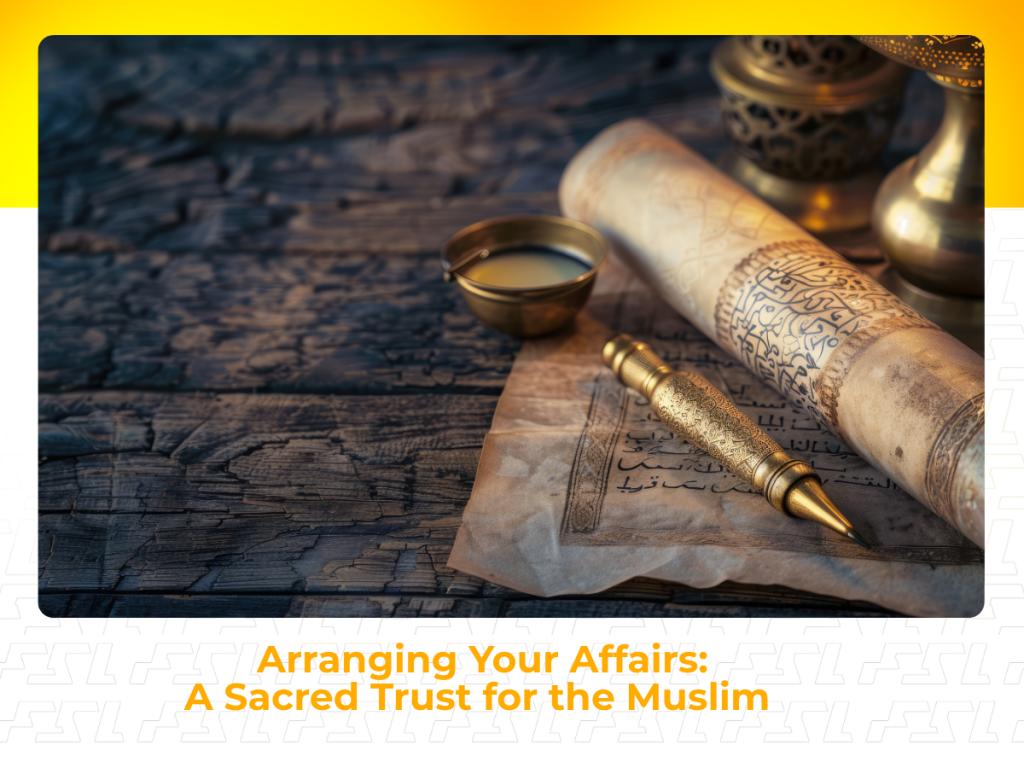Introduction
In Islam, life and death are deeply intertwined, and preparing for the inevitable is both a legal and spiritual responsibility. The Prophet Muhammad (peace be upon him) reminds us: “Take benefit of five before five: your youth before your old age, your health before your sickness, your wealth before your poverty, your free time before your preoccupation, and your life before your death” (Al-Hakim).
For a Muslim businessman, arranging one’s affairs is more than just wealth planning—it is an act of worship, a recognition that wealth is a trust (Amanah) from Allah . Ensuring that one’s wealth, business, and estate are managed according to Islamic principles is a sacred duty that extends beyond one’s lifetime.
The Quranic Foundation: Surah An-Nisa 4:11
Allah provides clear guidance on inheritance laws in the Quran:
“Allah instructs you concerning your children: for the male, what is equal to the share of two females. But if there are [only] daughters, two or more, for them is two-thirds of one’s estate. And if there is only one, for her is half. And for one’s parents, to each one of them is a sixth of his estate if he left children. But if he had no children and the parents [alone] inherit from him, then for his mother is one-third. And if he had brothers [or sisters], for his mother is a sixth after any bequest he [may have] made or debt…” (Quran 4:11).
This divine framework ensures fairness and justice among family members and underscores the importance of structuring one’s estate in accordance with Islamic law. For a Muslim HNI, adhering to these principles is a matter of both faith and accountability.
Estate Planning: Fulfilling the Trust
The fundamental Islamic belief is that wealth belongs to Allah and is only entrusted to individuals for responsible management. Estate planning is therefore not just about distributing assets—it is about fulfilling a trust (Amanah) with integrity and foresight.
Key considerations for a Muslim businessman include:
Drafting a Valid Islamic Will (Wasiyyah): A will ensures that up to one-third of one’s estate can be allocated to non-heirs, such as charities, Islamic institutions, or distant relatives, while the remaining two-thirds are distributed according to Quranic inheritance laws.
Settling Debts and Financial Obligations: Islam places a strong emphasis on clearing debts, including unpaid Zakat and other liabilities, to ensure the deceased’s soul is not burdened in the hereafter.
Appointing a Trustworthy Executor: An executor or trustee familiar with Islamic inheritance laws should be chosen to oversee the proper distribution of assets.
Ensuring Business Continuity: Shariah-compliant business succession planning ensures that the company continues ethically and sustainably, benefiting both heirs and society.
Ethical Business Practices: A Legacy Beyond Wealth
As a Muslim HNI, your responsibility extends beyond your lifetime. Islam mandates that one’s career and financial dealings must be halal—free from interest (riba), deceit, and unethical practices. By establishing an estate rooted in ethical business principles, a businessman ensures that his wealth remains pure and continues to benefit his family and community long after he is gone.
Practical Steps for the Muslim HNI’s
Seek Islamic Guidance: Consult qualified scholars to review business and estate structures to ensure compliance with Shariah.
Utilize Shariah-Compliant Advisory Services: Work with institutions like Fiduciary Services Limited, which specialize in Islamic estate planning and business structuring.
Educate and Prepare Heirs: Teach family members the principles of Islamic wealth management to ensure responsible stewardship of assets.
Conclusion
For the Muslim HNI, preparing for death is an act of faith and devotion. By structuring one’s affairs according to Quranic guidance and ethical principles, one secures both worldly and eternal rewards. As Allah (SWT) reminds us:
“And whatever you do of good deeds, Allah truly knows it well” (Quran 2:197).
Let your legacy be a testament to faith, justice, and responsibility—one that honors the trust Allah has placed in you.
Fiduciary Services Limited is committed to assisting Muslim clients in aligning their estate and business affairs with Islamic principles. Contact us today to ensure your legacy reflects your faith and values.
At Fiduciary Services Limited, we help clients plan their wealth and estate for their peace of mind, well-being, and family harmony.
You can schedule a consultation to talk about your existing Luxury Assets or investment by sending an email to contact@fiduciaryservicesltd.com



